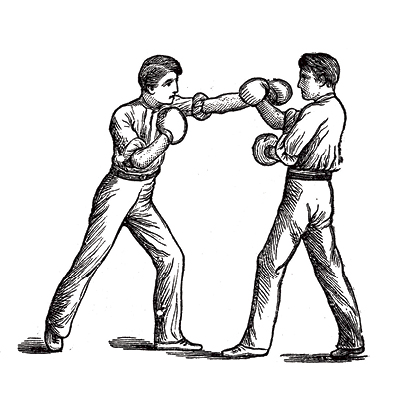Last week, Sir Michael Wilshaw sent a stern letter to headteachers who failed to stop a mass fight among pupils at their four schools.
The leaders ought to have got wind of the event and intervened, he said. It wasn’t always this way though; at one point in time schools literally taught children how to have a punch-up.
Until the 1960s, boxing was often taught in schools.
Over at flashbak.com – a website that gathers fabulous images of the past – you can find images of young boys in a Lambeth street thumping each other with boxing gloves (which, incidentally, were invented by Jack Broughton who opened the first boxing school in London in the 1700s).
The site explains how boxing was once fashionable in schools, but dropped out of favour in 1962. Why?
Many news stories from around the mid-2000s suggest it was because boxing was banned in schools but this isn’t actually true, as the flashbak article notes.
It was, however, affected by the Boxing Bill, a series of proposals brought to parliament by Labour MP Edith Summerskill, who wanted to ban boxing altogether.
When two boys get into a scrap it seems to me an excellent idea to put them into the boxing ring
Digging into parliamentary records reveals a marvellous debate in the Lords, where the issue of boxing in schools was brought to the fore.
Viscount Scarsdale (the Second) fondly talked of being trained in boxing from the age of nine and continuing his training while at Eton and in the Army. He scoffed at the idea of a potential for harm “because, my Lords, in the Army, in universities and in schools, three rounds are the limit”.
Lord Auckland (less glamorously known as Ian Eden) also spoke highly of learning boxing at school and referenced an unusual benefit of the sport.
“It is a particularly useful sport for young people, and when two boys get into a scrap it seems to me an excellent idea to put them into the boxing ring. Certainly at the school which I attended for some five years that was done, and any occasions of bullying were treated likewise. On a number of occasions the bully was put into the ring with the school boxing instructor, and to my recollection he did not bully again.”

Such was the force of these arguments, the bill was never passed and yet, somehow, it appears a belief arose that boxing in schools had been banned.
Various websites claim it was because the sport was dropped from the national curriculum; but there was no national curriculum in 1962.
Records also reveal that in 1966, then education secretary Anthony Crosland was asked if the Inspectorate of Physical Education had issued a circular advising education authorities in London to ban the teaching of boxing to school children because of possible physical injuries.
A curt answer came back: “There has been no such circular.”
Asked next if he would advise against the sport, an even more curt answer is recorded: “No.”
Thus, boxing was never banned, but it dropped out of favour in PE lessons, with boys instead pushed to take part in extra-curricular boxing clubs, which have fluctuated in popularity over the years.
In 2007, England’s boxing association (it changes its name a lot) put cash and marketing behind a new push to boost the sport, which reportedly increased participation by a third, although the British Medical Association seemed quite distressed at the time and put out statements saying it would prefer it to be banned altogether.







SABA, with the much appreciated support from the then Sports Minister, Kate Hoey, has worked with the examination boards to agree a boxing syllabus. This enables students, studying Physical Education at both GCSE and A/S Level, to use his/her boxing skills in practical assessment which will contribute to the final mark. The issue took 10 years to resolve. I repeat, I doubt we would have been successful had Kate Hoey not compelled the exam boards to listen to SABA’s appeal for ‘fair play’.
In schools today that have boxing, is it compulsory, or can children opt out?
Is it compulsory in some countries’ schools?
Any pupil/student can opt out of participation in school boxing. Boxing is not compulsory. Schools can, and do, teach boxing as an extra curricular activity. Inter- school (boxing skills) competition does take place in Education. Pupil knowledge of amateur boxing skills/training and competition can be used in school examinations and is determined by the Examination Board.